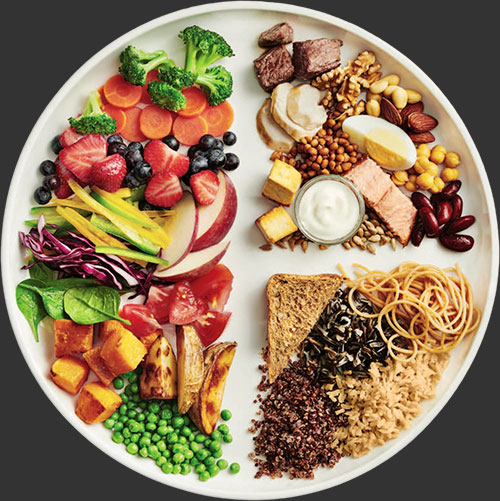Canadians eat a moderate amount of red meat. On average Canadians eat 61 g of unprocessed red meat per day (288 g per week).
That’s less than three 100-gram servings, or roughly enough to account for 3 meals – 2 dinners and a lunch for example.
On average, Canadian adults receive only 17% of their total daily calories from protein according to the most recent national survey. That is at the lower end of the recommended 10-35% of calories from protein.
Download our Nutrition Facts here
Canada’s Food Guide
Canada’s Food Guide encourages Canadians to ‘eat plenty of vegetables and fruits, whole grain foods and protein foods. According to Health Canada, these ‘nutritious foods are the foundation for healthy eating’. Healthy eating means choosing nutritious whole foods most of the time, while discretionary (treat) foods should be occasional.
The food guide plate approach shown below is a simple way to achieve flavour, satisfaction and nutrition in a meal.
 |
Using this visual approach, building balanced, healthy meals includes:
- Vegetables and/or fruit on ½ of the plate
- Whole grain foods on ¼ of the plate
- Protein foods on ¼ of the plate
|
A healthy eating pattern includes protein foods such pork, beef, lamb and veal.
If you are looking for information, cooking tips and recipes for Canadian beef, Canadian pork and Canadian lamb visit these websites:
Canadabeef.ca
Verifiedcanadianpork.com
Freshcanadianlamb.ca
Nutrition – Did you know…
Did you know that red meat is a superfood?
The nutrients in meat strengthen the immune system, contribute to the formation of red blood cells, hormones, and muscle tissue, and ensure proper functioning of the nervous system. These nutrients also impact our senses of taste and smell, benefit our thyroids, and support antioxidant production
Natural & Complete Protein
Natural & Complete Protein
Protein found in meat is “complete” because it contains all the amino acids essential for health (builds muscle, strengthen the immune system, help maintain a normal metabolism).People cannot naturally produce all of the necessary amino acids, making adequate dietary consumption critical.
[?]
Institute of Medicine. 2005. Dietary Reference Intakes for Energy, Carbohydrate, Fiber, Fat, Fatty Acids, Cholesterol, Protein, and Amino Acids. Washington, DC: The National Academies Press.
https://doi.org/10.17226/10490
B12
Vitamin B12 plays a key role in maintaining brain and nervous system function, normal metabolism, and high energy levels. Followers of a vegan diet, which contains no animal foods, must add Vitamin B12 through supplements, fortified foods, or certain types of seaweed or nutritional yeast.
[?]
Institute of Medicine. 2001. Dietary Reference Intakes for Thiamin, Riboflavin, Niacin, Vitamin B6, Folate, Vitamin B12, Pantothenic Acid, Biotin, and Choline.
https://www.nap.edu/read/6015/chapter/1
Blood Sugar Control
A high protein and low carbohydrate diet, which could include lean meat can help to control blood sugars.
[?]
Gannon MC, Nuttall FQ. Effect of a high-protein, low-carbohydrate diet on blood glucose control in people with type 2 diabetes. Diabetes. 2004 Sep;53(9):2375-82.
Muscle Health
High-quality animal-sourced proteins, like meat and dairy, help prevent muscle loss as we age more effectively than plant-sourced proteins, like legumes and tofu.
[?]
Berrazaga, Insaf et al. The role of the anabolic properties of plant- versus animal-based protein sources in supporting muscle mass maintenance: A critical review. Nutrients vol. 11,8 1825. 7 Aug. 2019.
Heart Health
Heart and Stroke notes “the overall quality of one’s diet, combined with the types, qualities and quantities of foods, have more impact on health than any single nutrient such as saturated fat.”
[?]
Heart & Stroke Foundation Position Statement: Saturated Fat Heart Disease and Stroke. August, 2015.
Iron Rich
Heme iron is found in meats such as beef and pork, whereas plant foods like tofu, dried fruit, legumes, and grains contain only non-heme iron. Heme iron is more easily absorbed by the body than non-heme iron.
[?]
Institute of Medicine. 2001. Dietary Reference Intakes for Vitamin A, Vitamin K, Arsenic, Boron, Chromium, Copper, Iodine, Iron, Manganese, Molybdenum, Nickel, Silicon, Vanadium, and Zinc.
https://www.nap.edu/read/10026/chapter/1
Hunger Curbing
Research shows higher protein diets – 25 to 30 grams of protein per meal – improves satiety, which means they help keep you feeling fuller for longer. Dietary counselling can help people plan the optimal protein diet.
[?]
Phillips SM et al. Protein “requirements” beyond the RDA: Implications for optimizing health. Appl Physiol Nutr Metab 2016;41:565-572.
Selenium-Rich
A serving of beef or lamb delivers half a human’s daily selenium needs. Selenium is an antioxidant that helps prevent cell damage, promotes proper thyroid function, and may contribute to cancer prevention.
[?]
Zinc Immunity
Zinc helps maintain optimal immune function and promotes wound healing. Beef is the top dietary source of zinc in the diet.
[?]
Institute of Medicine. 2001. Dietary Reference Intakes for Vitamin A, Vitamin K, Arsenic, Boron, Chromium, Copper, Iodine, Iron, Manganese, Molybdenum, Nickel, Silicon, Vanadium, and Zinc.
https://www.nap.edu/read/10026/chapter/1
Natural & Complete Protein



